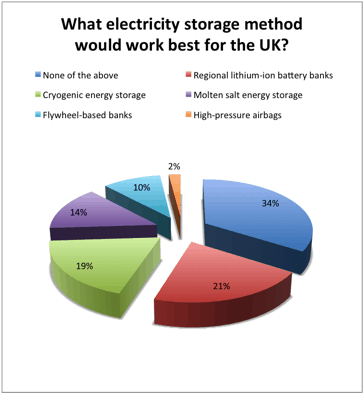We had a strong but confusing response to last week's poll on energy storage. With 518 readers contributing to the poll, it was one of the most popular we have held. However, the largest group of respondents, 34%, declined to pick one of the options.
This does not happen very often, and it's difficult to draw conclusions from it. However, from the extremely lively discussion in the comments section - 64 comments when the poll was closed - it seems that at least some readers picked "none of the above" because they thought that no single option would be best for the UK, but rather that a mixture of different technologies was the best way forward.
Of the other options we presented, banks of lithium-ion batteries were the most popular, with 21% of the vote. Cryogenic energy storage came second with 18%, and molten salt storage third on 14%. Energy storage based on flywheels gathered 10% of the votes, while pressurised air bags were the least popular on 2%.
What we can gather from this is that engineer readers believe that a technological solution to the intermittency of renewable energy production is a necessity, and we saw several examples of ingenious ideas in the comments section. Some readers mentioned pumped hydro, but equally it was pointed out that this is dependent on having the right landscape; most parts of the UK do not. Liquid hydrogen was mentioned several times, with surplus electricity produced by renewable energy being used to electrolyse water. The much-mooted Severn barrage was also mentioned by commenters, with the additional option of a Thames barrage to harvest energy from the rising tides on the other side of the country.
One intriguing comment mentioned gravity storage, with weights being lifted and dropped in disused mineshafts and oil wells, plus a form of pumped storage with water tanks on roofs.






JLR teams with Allye Energy on portable battery storage
This illustrates the lengths required to operate electric vehicles in some circumstances. It is just as well few electric Range Rovers will go off...